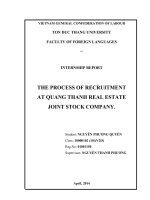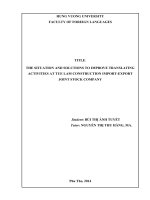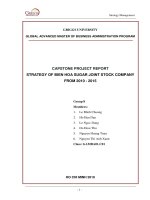EVALUATION OF THE REAL SITUATION OF IMPORT ACTIVITIES OF VIETNAM ENERGY DEVELOPMENT SUPPORT JOINT STOCK COMPANY FROM 2009 TO 2011. PROBLEMS AND SOLUTIONS.
Bạn đang xem bản rút gọn của tài liệu. Xem và tải ngay bản đầy đủ của tài liệu tại đây (366.27 KB, 49 trang )
NATIONAL ECONOMICS UNIVERSITY
FACULTY OF FOREIGN LANGUAGES
ENGLISH FOR BUSINESS DEPARTMENT
--- o0o ---
VO THI KHANH CHI
EVALUATION OF THE REAL SITUATION OF
IMPORT ACTIVITIES OF VIETNAM ENERGY
DEVELOPMENT SUPPORT JOINT STOCK
COMPANY FROM 2009 TO 2011.
PROBLEMS AND SOLUTIONS.
Võ Thị Khánh Chi – CQ503823 – Business English 50B
Hanoi, April, 2012
2
NATIONAL ECONOMICS UNIVERSITY
FACULTY OF FOREIGN LANGUAGES
ENGLISH FOR BUSINESS DEPARTMENT
VO THI KHANH CHI
EVALUATION OF THE REAL SITUATION OF
IMPORT ACTIVITIES OF VIETNAM ENERGY
DEVELOPMENT SUPPORT JOINT STOCK
COMPANY FROM 2009 TO 2011.
PROBLEMS AND SOLUTIONS.
Supervisor:
LE THI THU HA
Võ Thị Khánh Chi – CQ503823 – Business English 50B
Hanoi, April, 2012
2
Võ Thị Khánh Chi – CQ503823 – Business English 50B
ACKNOWLEDGEMENT
This report would not have been possible without helpful and sincere
support. Therefore, I would like to express my deep gratitude to those people whose
direct and indirect support helped me complete my report in time.
Firstly, I would like to show my warm and sincere thanks to all the lecturers
of the Faculty of Foreign Languages of National Economics University. By being
taught the related subjects, I have learnt many essential skills and business knowledge
to carry out this research and finish this report. Besides, it is pleasure to thank to Mrs
Nguyen Thi Thuy who gave me guidance during the period of this study.
Secondly, I am grateful to my supervisor, Mrs Le Thu Ha who has directly
guided me during my study. She has spent much time supporting, correcting my
report to help me accomplish this report. From bottom of my heart, I honestly wish
her the best health and more success in her life and career.
Thirdly, I also would like to thank all the members of Vietnam Energy
Development Support Joint Stock Company especially my supervisor, Mr Nguyen
The Binh. They have shared about their experience and knowledge in import business
as well as support me the helpful documents, data related to my research. I will never
forget their sincerity and encouragement.
Finally, I owe my deepest gratitude to my beloved family and friends who
always stand by me and create favorable conditions for me to complete the report.
TABLE OF CONTENTS
i
Võ Thị Khánh Chi – CQ503823 – Business English 50B
ii
Võ Thị Khánh Chi – CQ503823 – Business English 50B
LISTS OF ABBREVIATION
VNEDS JSC: Vietnam Energy Development Support Joint Stock Company
EU: European Union
&: And
LISTS OF FIGURES
iii
Võ Thị Khánh Chi – CQ503823 – Business English 50B
EXECUTIVE SUMMARY
In recent years, in the context of blooming globalization and deep integration
of countries into the world’s economy, import and export business in Vietnam is
significantly considered as an effective tool to promote growth and economic
development of the country, expand integration into the international trade market. As
a young company in the field of import of energy -supported equipment, the Vietnam
energy development import support joint stock company is constantly developing to
confirm its reputation in the domestic market. However, during global economic
crisis, the business activities of company especially import faced many difficulties
and obstacles. The import business‘s efficiency of the company influenced by many
inside and outside factors was not maintain stably and not improved significantly.
Consequently, assessing its import activities and providing some useful solutions to
promote its business’s effect is seemed to be necessary and practical. That’s the
reason why I chose “Evaluation of the real situation of import activities of Vietnam
energy development support joint stock company from 2009 to 2011. Problems and
solutions” as the subject of this report.
Apart from the introduction and conclusion, the final report is divided into four
chapters. The first chapter provides readers with the knowledge of the company’s
establishment and development, strategic orientation and organizational structure.
The second chapter presents theoretical background which mentions basic theories
about import activities and factors affecting the company’s import efficiency. Chapter
three deals with analysis and evaluation of import activities of Vietnam energy
development support Joint Stock Company. The last chapter gives some
recommendations to improve the effectiveness in import activities of the company.
iv
Võ Thị Khánh Chi – CQ503823 – Business English 50B
INTRODUCTION
1. Statement of the problem
Nowadays, in the age of global economic integration, promoting import and
export activities is considered as the biggest priority of Vietnam to expand and
occupy regional and international markets. Besides encouraging export in order to
boost domestic production and increase foreign exchange earnings, import is
considered as a basic aspect of foreign trade and an important way for economic
development. Import has been helping the nation explore its potentials, advantages
and supplement the products which cannot be produced domestically or the amount of
products cannot meet consumption.
However, despite the advantages of importing, many economists and
governments believe that importing goods can lead to the erosion of their national
economies—especially when imports exceed exports. There are many discussions
around the negative effects of the import on the global as well as individual
economies. The economists have talked much about the trade balance deficit or the
loss of competitiveness resulting from the over-reliance on the import and the worries
that the super-import will kill the domestic production seem to never end.
Moreover, the international economic integration has created not only new
chances but also big risks for enterprises. The multinational trade agreements and
their regulations along with respective national trade policies causes great challenges
for the enterprises to import the best technology, machine and equipment with low
cost in short time. Being established in this context, Vietnam energy development
support joint stock Company which focuses on importing energy supported products
had to face various inside and outside difficulties threatening its survival. Thus, in
order to continue to maintain stably and confirm its reputation in the domestic market,
it is necessary for the company to have an evaluation of the impacts of the import on
the company’s business, especially its business results. The evaluation will bring an
insight into the company’s business state in recent years and solutions to improve its
efficiency. Therefore, through the activities of the company in recent years that I
researched during my internship period, I would like to make a report on: “Evaluation
of the real situation of import activities of Vietnam energy development support joint
stock Company from 2009 to 2011. Problems and solutions”
1
Võ Thị Khánh Chi – CQ503823 – Business English 50B
2. Purpose and Scope of work
This report mainly aims at:
- Finding factors affecting import activities of Vietnam energy development
support Joint Stock Company.
- Analyzing the situation of import activity of the company in recent years.
- Evaluating the importance and effectiveness of those activities.
- Recommending some solutions to enhance import activities.
Scope of this report:
The scope of this report is about the real situation of import activities of
Vietnam energy development support Joint Stock Company during the period from
2009 to 2011. Based on findings and analyses, the author would give some
suggestions to enhance export activities in the near future, first of all, in 2012.
3. Research question
The report will be analyzed to answer these questions as follows:
1. How did the import activities operate during the period from 2009 to 2011?
2. What difficulties has the company encountered?
3. What should be done to improve the effectiveness of import activities and
strengthen the company’s position in market?
4. Methodology
The study is primarily based on the data from the Vietnam energy
development support Joint Stock Company. Within the scope of this research, growth
factor analysis is utilized. Besides, table chart analysis is used to further clarify
matters.
Furthermore, descriptive analysis is also made use of through looking at the
history and development of the company. Through results of the analysis from the
data, the author point out achievements and shortcomings in import operation of the
company. Finally, some critical solutions are recommended to narrow down the
disadvantages and enhance its import operation efficiency.
2
Võ Thị Khánh Chi – CQ503823 – Business English 50B
CHAPTER I:
INTRODUCTION OF VIETNAM ENERGY DEVELOPMENT SUPPORT
JOINT STOCK COMPANY
As a young company in the field of import of energy -supported equipment,
the Vietnam energy development import support joint stock company is constantly
developing to confirm its reputation in the domestic market.
Vietnam energy
development support joint stock company with just three years in operating, it has
been high appreciated and recommended by its foreign and Vietnamese clients whom
trust the company by giving it more projects like telecommunication, broadcasting,
networking system, finance banking, education, hospital, commercial office,
factories, etc… because of the experienced engineers, skill staffs, their loyalty at
work and the quality of work. However, during global economic crisis, the business
activities of company especially import faced many difficulties and obstacles. The
import business‘s efficiency of the company influenced by many inside and outside
factors was not maintained stably and not improved significantly. Therefore, in this
chapter, the author will provide the viewers with an overview of the company
including its history of foundation and development, strategic orientation and
organizational structure to understand more the matters which the company is being
coping with.
1.1 History of foundation and development
1.1.1 General information
Name:
Vietnam Energy Development Support Joint Stock Company
Headquarter: Number 365, Hoang Quoc Viet Street, Tu Liem District, Hanoi
Tel:
0903430580
Email:
1.1.2 The establishment and development
Our society is progress rapidly in accompany with the development of science
and technology, sophisticated and highly susceptible microprocessor based on
electronics and data communication networks are created to serve people. Vietnam
energy development support joint stock company is one of the professional
companies specialize in the energy development and support in Vietnam.
3
Võ Thị Khánh Chi – CQ503823 – Business English 50B
Being founded in 2009, the company is responsible for importing and
distributing lightning protection products and electrical equipment such as electronic
meters, insulators; providing installation, maintenance, consultancy and designing
services; supervising of installation of system and measuring of lightning protection,
grounding systems and transient voltage surge suppression technology.
Vietnam energy development support joint stock company with just three
years in operating, it has been high appreciated and recommended by its foreign and
Vietnamese clients whom trust the company by giving it more projects like
telecommunication, broadcasting, networking system, finance banking, education,
hospital, commercial office, factories, etc… because of the experienced engineers,
skill staffs, their loyalty at work and the quality of work. The company provides high
quality products to satisfy variety customer’s needs by choosing the world leading
manufacturers like Alltec (USA), Aplicaciones Tecnologicas (Spain), Cylix (USA),
Citel (France),etc in order to distribute and develop their products in the local
market.
At the early stage, the company had the start-up capital of 610 million VND
and the labor force of only 12 people. Up to present, the capital of the company
reached 4,5 billion VND and the total workforce is 45 people. Almost employees
have graduated university with the major of Economic, Technology and International
Trading.
1.1.3 The business
Vietnam energy development support joint stock Company specializes in
trading lightning protection products and electrical equipment such as electronic
meters, insulators, fuse cutout, disconnect switch. The company also providing
installation, maintenance, consultancy and designing services; supervising of
installation of system and measuring of lightning protection, grounding systems and
transient voltage surge suppression technology.
Among all the business activities, importing and distributing electrical
equipment is the key activity that generates the majority of the company’s revenue.
Approximately, the contribution of that activity to the company’s overall revenue
accounts for two thirds of the total. The company also determines that activity to be
the key for its sustainable development. The others activities constitute a third of its
earnings.
4
Võ Thị Khánh Chi – CQ503823 – Business English 50B
VEDS SJC has strong business relationship with many suppliers around the
world , including : Toyo Tanso Co., Ltd in Japan, Alltec Corporation in USA,
Aplicaciones Tecnologicas, S.A in Spain, Chauvin- Arnoux in France, Cylix in USA,
Citel in France ,etc.
The major market of the company’s products is North Vietnam. The area’s
consumption accounted for up to 87% of the total sales of the company in 2011. The
Central Vietnam and the others took up the last 13% of revenue generated from the
activity.
The customers of VEDS JSC are mainly commercial offices, factories,
hospitals, schools and households. Up to 57% of its products are sold to factories,
around 38% for commercial offices, hospitals, schools and the last 5% for
households.
The main competitors of Vietnam Energy development support joint stock
Company on the market is Cat Van Loi Industrial Electrical Equipment Company and
Viet A Electrical Engineering Limited Company. These companies do the same
business as VEDS JSC with a very similar product list. Therefore, there are always
tacit competitions among the companies in the price as well as quality of the
products.
1.2 Strategic Orientations
• Mission
-
Becoming a large-scale multi-sector Group in the field of Power Industry
and Energy Development in Vietnam
- Step-by-step keeping up with famous companies in the world, helping the
Company’s employees lead a life with material sufficiency and spiritual
abundance
- Bringing success to customers, business partners and contributing to the
community.
• Strategic vision
- Becoming a large-scale multi-sector Group in the field of Power Industry and
Energy Development in Vietnam.
- International quality product and brand
- Pioneering research and development of qualified electric equipment
• Quality objectives:
5
Võ Thị Khánh Chi – CQ503823 – Business English 50B
Ensuring to provide products and services that satisfy all committed
agreements.
- Improving quality of products and services to satisfy customers’ higher and
higher demand.
- Being a reliable partner and a loyal companion of customers.
• Business philosophy:
- Prestige maintenance
- Best quality guarantee
- Sustainable relationships and partnership with business partners and
customers
- Employees’ benefits guarantee
1.3 Organizational Structure
As a small-scale enterprise, VEDS JSC‘s management structure includes a
-
general director and two deputy director (one deputy director is in charge of finance
and administration and the other is in charge of technique). In which, the general
director is the head of the company and he is responsible for controlling and deciding
all company’s activities. The two vice-directors assist the director in running the
company. They are responsible to the director for the functioning of their department.
6
Võ Thị Khánh Chi – CQ503823 – Business English 50B
Chart 1: Organizational structure of Vietnam Energy Development
Support Joint Stock Company
a. The Board of Director including General Director and two Deputy Directors
are responsible for commanding and controlling all business activities of the company
such as ensuring profitability, growth and development of the entire company,
achieving the objectives of the company on sales growth, profit, personnel
development and others.
In particular, the Director’s missions are:
- Laying down the objectives and broad policies of the company
- Preparing strategic plans and policies for the company
- Controlling and cooperating the activities of all departments
The Deputy Director of Finance and Administration is in charge of all financial and
fiscal management aspects of company operations. Key duties of Deputy Director of
Finance includes staff management, cash and risk management, accounting and
financial controls and budgeting.
7
Võ Thị Khánh Chi – CQ503823 – Business English 50B
The Deputy Director of Technique is in charge of the issues related to technology.
b. Import Department is managed by the deputy director who is in charge of
finance and administration. Its main functions are:
- Researching foreign markets about energy-supported products to design and
implement import business plan.
- Directly importing products, setting up import plans and implementing import
procedures.
- Signing economic contracts, jointing ventures with businesses in and outside
the country and other relevant organizations.
- Borrowing from domestic and foreign organizations to invest in producing,
purchasing with foreign countries.
c. Administration Department advises on Director to:
- Arrange mechanism of organization and of the personnel;
- Scrutinize performance of local units;
- Implement policy of training and foresting staff;
- Protect internal organization;
- Reward and discipline employees.
d. Accounting Department is responsible for helping Director check, manage,
control financial and monetary activities; manage, calculate the efficiency in business.
f. Equipment Department or Technical department is in charge of selling
equipment and providing after sale services. It is responsible for installing equipment
and instructing customers on how to operate them, repairing the equipment when
customers request. It also organizes professional training, and coordinates with the
import department to train workers for the implementation of projects.
g. Research and Development Department conducts researches for new
products and develop new solutions.
CHAPTER II:
THEORETICAL FRAMEWORK
8
Võ Thị Khánh Chi – CQ503823 – Business English 50B
In this chapter, the author will provide all information about import,
including concept, characteristics, roles and forms of import. Besides, some issues of
import products and factors affecting energy- supported product import activities of
Vietnamese enterprises as well as VEDS JS Company will also be presented here.
2.1 Terms and definitions
This part of the report will be helpful to understand more about findings and
analysis part later. The definitions of import and energy supported product import as
well as matters related to these will be used as foundation for analyzing data. They
are stated as follows:
2.1.1 Concept and characteristics of import
a. Import’s definition:
Import together with export is the two crucial components of international
trade. The term” import” is derived from the conceptual meaning as “to bring in the
goods and services into the port of a country” (Joshi, Rakesh Mohan, (2009)
International Business, Oxford University Press, New Delhi and New York, pp.178)
or “to consist of transactions in goods and services( sales, barter, gifts or grants) from
non-residents to residents” (Lequiller, F; Blades, D.: Understanding national
Accounts, Paris: OECD 2006,pp. 139-143). In other word, import business is
considered as the transactions of goods and services from overseas to develop
domestic business and social life under the provisions of the international market
(import quota, tariff and trade agreements). Enterprises import goods and services to
supply to the domestic market at a cheaper price and better quality than competing
goods manufactured in the local market. They also import products that are not
available in the local market. The buyer of such goods and services is referred to an
“importer” who is based in the country of import whereas the overseas based sellers
is referred to as an ‘exporter”
Besides, import is a process of trading goods between different countries,
relying on the principle of equivalences of exchange with monetary as intermediary.
It is a system of trade relations in an economy, which has both internal organization
and external ones. In general, import business means buying goods, materials from
foreign-based companies, selling them in domestic market or re-exporting with the
aim of making profit and connecting production between countries.
9
Võ Thị Khánh Chi – CQ503823 – Business English 50B
b. Importing activities have basic characteristics based on different countries
such as:
- Import operation is controlled by many kinds of law such as International
agreement on foreign trade, International trade customs and national law.
- Trading methods on international market are diversified: ordinary transaction,
mediated transaction or transaction at fairs.
- There are varied methods of payment: barter, cash in advance, letter of credit,
documentary collection or draft, open account and other payment mechanisms.
- Currency used in transaction : strong currencies ( USD, Sterling, Euro)
- Import activities provide firms that have different nationalities with the chance
for long-term cooperation. International trade directly affects the political
economy relation and strengthens external economic relation of exporting
countries.
2.1.2 Roles of import
In the context that economic integration is gradually becoming an inevitable
and popular trend all over the world, import activities play an important role in
stimulating the economy’s expansion. Import is generally essential for the country’s
development and for enterprises in particular.
2.1.2.1 The role of import for national economy:
Imports are extremely important to the sustainable development of the
economy as follows:
- Bringing more products to the country’s market, helping enrich the market’s
current product base and giving consumers more choices in buying goods and
services.
- Allowing countries to achieve higher standards of living by obtaining products
and resources that cannot be obtained domestically.
- Satisfying the demand of the market of special goods.
- Creating favorable conditions for the transfer of technologies among countries,
helping to bridge the technological gaps.
- Participating in the international distribution of labor and enhancing
international cooperation.
- Creating competition between domestic goods and foreign goods which forces
domestic producers to make innovation.
2.1.2.2 The role of import for enterprises:
10
Võ Thị Khánh Chi – CQ503823 – Business English 50B
Nations all over the world, nowadays, are increasingly involved in the global
integration. There are various reasons for the firms to buy goods and services from
overseas. Some firms may import goods to resell in domestic market to gain profits.
The others may meet difficulty in controlling the whole production process; they have
to import goods and services to make up for its production disability.
With the firm specializing in trading imported goods, import is the core activity
of its business.
- Helping gain profit by buying and reselling the imported products.
- Deciding the firm’s existence, its success or failure.
With production firm importing for production purpose, the import directly
participate in the firm’s production process.
- Helping solve serious problems about the inputs for the production process,
therefore, ensuring the production’s continuity.
- Helping cut down the company’s overhead cost, from which enhancing the
company’s profit.
As a result, import is crucial to the firm’s development.
2.1.3 Forms of import
There have been a various forms of import used all over the world. Along with
the development of science and technology and the cooperation among countries,
forms of import are increasingly professional and achieve great efficiency. Depending
on the enterprises’ capacity as well as the requirements of partners, they can apply
one of four forms of import or combine these follows:
2.1.3.1 Direct import
Direct imports are products imported directly into a country and not through the
manufacturer's authorized agent/distributor. Since there is no factory-authorized
middleman involved in the import of these products, the added costs are lower and
the customer pays less. In addition, many items that are in short supply or are not
imported at all by the manufacturer's authorized distributors can be procured as direct
imports. There is no difference in the actual products. In most cases, they are
manufactured in the same place by the same people and with the same materials.
Occasionally, manufacturers will give them a different name. .In order to sign import
contract, domestic firms must carefully research the demand of importing materials
11
Võ Thị Khánh Chi – CQ503823 – Business English 50B
and equipment in local market, calculate expenses that can ensure the efficiency of
import business, negotiate about the terms of trade with exporters and comply with
legal corridor and global practice.
Direct import is simply to carry out. The importer has to research market, find
partner, sign and fulfill contract, provide capital, incur risks and costs of transaction,
merchandise exchange and other costs related to goods consumption, customs.
2.1.3.2 Commission import
Commission import occurs when a local company wants to import products but
not entitled to do that by its own. That company, hence, must entrust another
company to finish the import procedure. After the consignee completes import
procedure it will gain remuneration called ‘entrusts fee”.
In this mode of import, entrusted company has not to do market research or pay
any financial contribution. The consignee must draw up two contracts. One to buy
products from foreign manufactures, another is the written agreement between the
consigner and the consignee.
2.1.3.3 Reciprocal trade
Reciprocal trade is a transaction method in which import closely combines with
export, the buyer is also the seller and vice versa. The amounts of goods and services
exchanged have equivalent value. Reciprocal trade depends on four principles of
balance: commodity balance, price equilibrium, balance in the same terms of delivery
and balance in the total amount of goods exchanged.
The advantage of reciprocal trade is that with only one contract, firms may
import and export all the same time. Goods delivered have equivalent value with
goods received.
2.1.3.4 Temporary import or re-export
Temporary import or re-export means a company import products not for local
consumption but for export to the third country for profit. The imported goods are not
treated or processed in the re-export country. Therefore, there are three countries
participate in this import procedure: the import country, the re-export country and the
export country. The re-export firms have to perform two contracts: one import
contract and one export contract. They don’t have to pay import-export tax.
2.2 Factors affecting import activities
12
Võ Thị Khánh Chi – CQ503823 – Business English 50B
In fact, every movement of the company is influenced by business environment
which includes external and internal factors. As a result, before conducting any
import activity, the company must carefully consider all the factors to minimize the
cost and maximize the profit. The detail information about external and internal
factors is given as follows:
2.2.1 External factors
External factors are the factors from outside environment and the businesses can
not adjust but can only harmonize and adapt to the changes. These factors include:
2.2.1.1 Political and legal environment
Business efficiency is strongly affected by the developments in the political
environment. The political environment consists of laws, government agencies, and
pressure groups that influence and limit various organizations and individuals in a
given society. Well-conceived regulation can encourage competition and ensure fair
markets for goods and services. Thus, governments develop public policy to guide
commerce-sets of laws and regulations that limit business for good of society as a
whole.
Moreover, the biggest difference between doing business locally and
internationally is the impact of foreign laws, and international conventions. Import
contracts and import activities must abide by the laws of the exporting country, the
law of a third country (if specified in the import contracts), international business
practices and international conventions, treaties that the parties participate. The laws
and regulations of the exporting country can make the process of import business
simpler or more complex, which affects the import operating costs and thus import
activities’ efficiency.
Therefore, before conducting import, enterprises must clearly understand
international laws and the laws of the exporting countries.
2.2.1.2 Fluctuations of exchange rates
The exchange rate is an important factor affecting import prices or the cost of
imported products, thus affecting the efficiency of the import business. When the
exchange rate increases, the cost of one unit of imported goods increases accordingly
and therefore it reduces the competitiveness of the goods, their consumption and
business efficiency. Conversely, when the exchange rate falls, the price of one unit of
13
Võ Thị Khánh Chi – CQ503823 – Business English 50B
imported goods also declines, and thereby it increases the competitiveness of the
products, their consumption and business effectiveness.
2.2.1.3 Competitors
For a business, competitors include current competitors and potential
competitors. Enterprises must study the current competitors and potential competitors
to find out their strengths and weaknesses in order to look for suitable orientations,
especially suitable marketing programs. This will make businesses and their goods
not be confused with other businesses, and increase their competitiveness in the
market.
2.2.1.4 Other factors
Other factors in domestic and international markets include demographic
factors, culture, traditions, and natural conditions. These factors will affect production
practices and consumption habits of each country.
Law and business environment are external factors that individual business
cannot change. They must comply with them and take steps to adjust their operations,
organizational structure in accordance with the rules in the markets they operate in.
2.2.2 Internal factors
In contrast to external factors, internal factors are factors that businesses
themselves can control and adjust. In order to raise efficiency of import activities,
enterprises should pay attention to these factors:
2.2.2.1 Financial resource
This is also a considerable factor to the success of the company. A business
needs to develop and maintain an adequate level of working capital in order to run
smoothly. No business can run successfully without an adequate amount of capital.
When there is not enough working capital, the following problems occur: business
can no longer operate effectively and become disrupted, business may need to
liquidate their assets in order to meet their financial obligations, and business may
lose ability to obtain credit.
2.2.2.2 Human resource
These reflect in the number of employees, their qualifications and working
ability and management level. Human resources are the determining factor in every
business. The qualifications and capabilities of human resources must be consistent
with the type of business. Therefore, enterprises should evaluate and develop their
human resource.
14
Võ Thị Khánh Chi – CQ503823 – Business English 50B
2.2.2.3 Management level
Each enterprise is a unified system made up of multiple linkages towards a
goal. In order to succeed in long run, enterprises need create a level of organizational
management which is correlative to its own financial strength. Organizational
management level refers to the perfection of organizational structure, the efficiency of
management system, etc.
2.2.2.4 Target customers
The target customers and the types of goods a company offers can have effect
on the level of price elasticity of demand. For example, when there is inflation or
price increases, the demand for commodities aiming at high incomes group will
decrease less than that for low and middle-income groups. On the other hand,
different target clients will have different requirements for the same product category,
and therefore, the marketing strategy, and product introduction for each type of
customer is different.
2.3 The importation process
To import products, companies must first establish agreements with
international producers in accordance with national and international regulations and
trade covenants. Companies considering importing products often begin their research
into what products to import by contacting various international consulates, which
can offer information on the manufacturers and distributors in their respective
countries.
Besides, importers must obtain the appropriate licenses from the government,
which authorizes them to import goods. Then, they must follow the Vietnamese
procedures to bring about the legal "entry" of imported goods. When the shipment of
these goods arrives at one of the country's officially designated ports of entry, the
importer must file entry documents with the port director and pay all relevant duties.
Importers can enter goods for consumption, storage at the port of arrival, or
transportation to another port of entry following the same procedures as for the port
of arrival. The entry of imports for consumption involves two steps. First, importers
must file the mandatory documents within five days of the arrival of the goods to
have the goods released from customs' custody. Second, importers must file
documents for duty assessment. If importers want to store the incoming merchandise
at the port of entry, they may have it placed in a customs warehouse as a warehouse
15
Võ Thị Khánh Chi – CQ503823 – Business English 50B
entry for up to five years. During this period, importers may enter the stored
merchandise for consumption following the appropriate procedures.
Moreover, an invoice must accompany all imported goods and the invoice must
be prepared following the regulations. The invoice must include essential information
such as the port of entry, the names of the importer and exporter, a detailed
description of the goods, the quantity of the goods, the value of the goods, the
currency, and the country of origin. Specific products or kinds of products may
require the inclusion of additional information in the invoice.
In the second chapter, the author provided the theories background about
company’s import business. The chapter also mentions causes affecting import
activities. The real situation of import activities of the company will be evaluated in
detail in the next chapter.
16
Võ Thị Khánh Chi – CQ503823 – Business English 50B
CHAPTER III:
EVALUATION OF THE REAL OPERATION OF IMPORT ACTIVITY OF
VIETNAM ENERGY DEVELOPMENT SUPPORT JSC DURING THE
PERIOD FROM 2009 TO 2011
Chapter three will analyze the real situation as well as overall assessment of
import activities of Vietnam energy development support joint stock company in
recent years.
3.1 The real situation of the company from 2009 to 2011
3.1.1 The company’s capital
As a young company in the market, the Vietnam energy development
support joint stock company continuously carried out several measures to raise
additional funds besides equity and bank loans; for example; raising capital from the
officials and employees in the company from selling shares, thus, the company's
capital was preserved and developed. The situation of the company's capital is as
follows:
2009
Indicators
Total
capital
Fixed
capital
Working
capital
Value
2010
Share
(%)
Value
2011
Share
(%)
610,336,709
100
2,135,010,633 100
191,147,822
31
429,329,743
20
419,188,887
69
1,705,680,890
80
Share
Value
(%)
4,475,019,32
2
1,655,757,12
9
2,819,262,29
0
100
37
63
Table 1: Total business capital of the company from 2009 to 2011
Source (Accounting department- VEDS JSC.)
From the table above, we can see that the company's total capital increased
gradually over the years. The total capital increased rapidly from 610 million VND in
2009 to 2, 1 billion VND in 2010 after only one year the company joined the market,
and in 2011 reached the highest point at approximately 4 billion VND, an increase of
17









